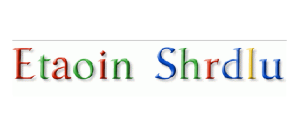Google Israel representative Etaoin Shrdlu anticipates that schools, phone companies, and other organizations that depend on alphabetization will almost all adopt the new alphabet order by 2025.
 Hertzliya, August 12 – Just days after announcing its reorganization under a new parent company called Alphabet, internet giant Google announced plans for rearrangement of the actual alphabet to reflect the actual ranking of letters, following the success of its system for displaying search results. The subsidiary of the company in Israel will spearhead the development effort.
Hertzliya, August 12 – Just days after announcing its reorganization under a new parent company called Alphabet, internet giant Google announced plans for rearrangement of the actual alphabet to reflect the actual ranking of letters, following the success of its system for displaying search results. The subsidiary of the company in Israel will spearhead the development effort.
Yesterday Google announced it was separating its core internet business functions such as search, Android, and others, from other development projects, such as self-driving cars, and placing both divisions under the ownership of Alphabet. As part of the reorganization, said incoming Alphabet CEO Larry Page, the company would use its clout in online computing and data management to rearrange the letters of the Latin alphabet to represent the real frequency with which they are used in speech and writing. The company’s Israel headquarters will undertake the primary development of the alphabet rearrangement, which a company spokesman said would be rolled out late next year.
Google Israel representative Etaoin Shrdlu anticipates that schools, phone companies, and other organizations that depend on alphabetization will almost all adopt the new alphabet order by 2025. “Obviously it makes sense to maintain the legacy order for some time to allow organizations, governments, and individuals to transition,” he said. “But we anticipate that already by 2022 the bulk of Latin-character-based data will be organized according to the new system.”
In English the first letter will be E, followed by T, A, O, I, and N, with each less-frequently-used letter ranked further down. English-language data will be the first to undergo the shift, said Shrdlu, followed soon after by other Latinate languages, which will have a slightly different order; for example, in English, the letter W occurs more often than almost half the other letters, but in French, it is all but nonexistent. “For languages that use non-Latin alphabets, our developers will conduct a robust study to determine which characters occur most often, and arrange that data accordingly,” he explained.
Shrdlu said the Israel office was selected as the epicenter of the new activity because of its proven ability to maintain its innovative edge and to quickly and effectively adapt to a changing online environment. “The irony here is that the new parent company Alphabet will soon refer inaccurately to what it represents,” he said. “That’s an abrupt shift. Mr. Page obviously thinks our Israeli team is uniquely suited to this task, having encountered constant use of the term ‘Palestine’ even though no such place exists any longer, and we are constantly expected to make it reflect something meaningful in an everyday context.”
He added that by 2030, most people would be calling the collection of letters in the language the Etatau.




